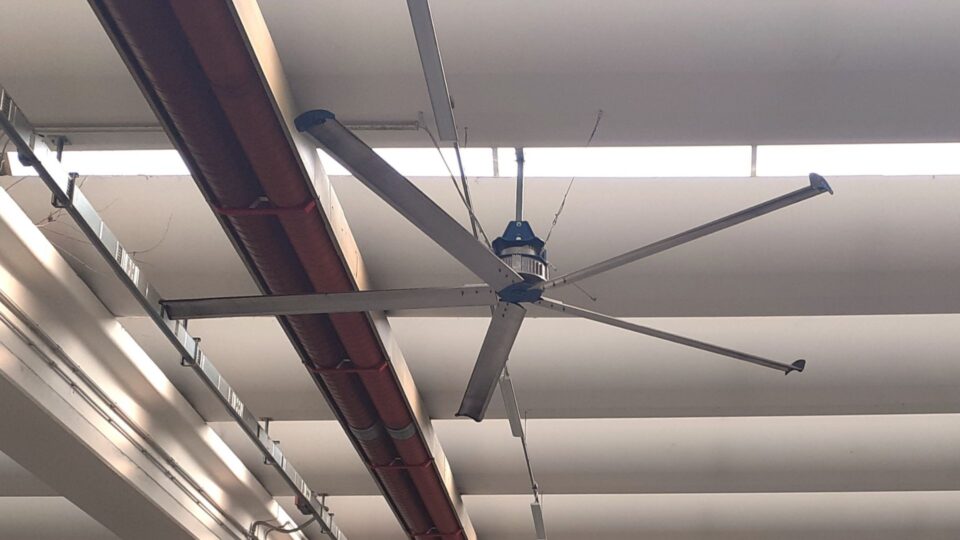Ceiling fans are an effective ventilation tool, providing cooling and air circulation to maintain cooler temperatures in residential and commercial properties. However, ceiling fans can also be helpful during winter.
Keep reading as we explore the ways you can utilise ceiling fans in winter to get the most out of your ventilation solutions year-round.
How do ceiling fans work in winter?
- Thermal destratification – you can redistribute warm air pockets during winter to reduce the need for excessive heating and ensure even temperature distribution.
- Minimising energy consumption – by ensuring no warm air is trapped around your ceiling, you can achieve improved energy-efficiency for your heating solutions and reduce energy consumption overall.
- Ensuring comfortable working conditions – by distributing warm air evenly, you can ensure your workers are comfortable and warm during the colder months. This helps to ensure industry compliance and reduce the potential for cold stress.
You can use ceiling fans in warehouses, manufacturing plants, and large open spaces to improve heating efficiency.
Benefits of using ceiling fans in winter
Achieving ROI on your ventilation investments
When you utilise ceiling fans during winter, this helps you to achieve positive ROI on your ventilation investments by way of increased air quality and temperature control, as well as by maximisation of the utility of the ceiling fan.
Maintaining air quality
In manufacturing and food processing environments, it is essential to maintain air quality by mitigating pollutants in the air. Various gases, dust, dirt, and particles in the air can contribute to lung disorders and break compliance with industry regulations. Ceiling fans help to provide fresh, clean air in your facility while reducing contaminants in the air.
Heating efficiency
When you heat a space, the hot air rises towards the ceiling and away from workers – reducing the benefit they gain from your heating investments. A ceiling fan pushes this hot air back towards the ground, providing even temperatures throughout your facility and encouraging energy efficiency, adequate heating, and worker comfort.
Mitigating moisture
Moisture can often build up in cold storage units or areas with sensitive equipment. When cold, air pockets form this can lead to condensation and increased moisture. This places your sensitive equipment at risk and could shorten its lifespan. A ceiling fan promotes airflow and prevents air pockets from forming to reduce the moisture in your facility.
Choosing a ceiling fan for your facility
When seeking a ceiling fan ventilation solution, it’s essential to consider the scope and scale of your requirements. You should consider your needs regarding ventilation and cooling during the summer, along with the winter applications of a ceiling fan.
A Giant Fan serves the needs of industrial and large facilities, providing ventilation, cooling, and temperature distribution year-round. Here are the advantages of choosing a Giant Fan:
- High airflow capacity – a Giant Fan can provide the airflow necessary to cool and distribute air throughout a large facility, ensuring thermal comfort.
- Durable construction – Giant Fans are built with reinforced blades and heavy-duty materials to withstand long-term use.
- Variable speed controls – enjoy the benefits of flexibility with options for controlling airflow to accommodate different seasons or varying operational needs.

How much power do ceiling fans use?
The power consumption of a ceiling fan ranges between 10 and 120 watts. The efficiency of your fan will depend on the fan size, speed settings, and additional features. Speaking to a ventilation expert will help you to find the most energy-efficient ventilation solution for your business.
Choose Fanquip for year-round ventilation solutions
A ceiling fan is not just restricted to summer use. You can use ceiling fans in winter for thermal destratification, regulating temperature distribution for more efficient heating. The industrial applications of ceiling fans help you to control moisture and airborne contaminants throughout the seasons.
Are you looking for a year-round ventilation solution? Contact our team at Fanquip. We can assess your industry-specific needs and recommend the most efficient solution for clean air and temperature regulation.
